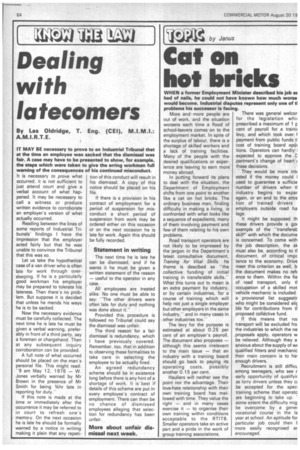Dealing with latecomers
Page 66

If you've noticed an error in this article please click here to report it so we can fix it.
By Les Oldridge, T. Eng. (CEI), M.I.M.I.: A.M.I.R.T.E.
IT MAY BE necessary to prove to an Industrial Tribunal that at the time an employee was sacked that the dismissal was fair. A case may have to be presented to show, for example, the steps which were taken to give the erring workman full warning of the consequences of his continued misconduct.
It is necessary to prove what occurred; it is not sufficient to just attend court and give a verbal account of what happened. It may be necessary to call a witness or produce written evidence to corroborate an employer's version of what actually occurred.
Reading between the lines of some reports of Industrial Tribunals findings I have the impression that the employer acted fairly but that he was unable to convince the Tribunal that this was so.
Let us take the hypothetical case of a van driver who is often late for work through oversleeping. If he is a particularly good workman his employer may be prepared to tolerate his lateness. Then there's no problem. But suppose it is decided that unless he mends his ways he is to be sacked.
Now the necessary evidence must be carefully collected. The next time he is late he must be given a verbal warning, preferably in front of a third party, say a foreman or chargehand. Then at any subsequent inquiry corroboration can be provided.
A full note of what occurred should be placed on the man's personal file. This might read: "9 am May 12, 1976 — W. Jones verbally warned by Mr Brown in the presence of Mr Smith for being 3/4hr late in reporting for duty."
If this note is made at the time or immediately after the occurrence it may be referred to in court to refresh one's memoiy. On the next occasion he is late he should be formally warned by a notice in writing making it plain that any repeti tion of this conduct will result in his dismissal. A copy of this notice should be placed on his file.
If there is a provision in his contract of employment for a period of suspension for misconduct a short period of suspension from work may be ordered either on this occasion or on the next occasion he is late for work. Again this should be fully recorded.
Statement in writing
The next time he is late he can be dismissed, and if he wants it he must be given a written statement of the reason — useful to the operator in any case.
All employees are treated alike. No one must be able to say: "The other drivers were often late for duty and nothing was done about it."
Provided this procedure is followed no Tribunal could say the dismissal was unfair.
The third reason for a fair dismissal is redundancy, which I have previously covered. Remember, too, that in addition to observing these formalities to take care in selecting the employee to be actually fired.
An agreed redundancy scheme should be in existence long before there is any hint of a shortage of work. It is best if details of this scheme are put in every employee's contract of employment. There can then be no chance of dismissed employees alleging that selection for redundancy has been unfair.




































































































